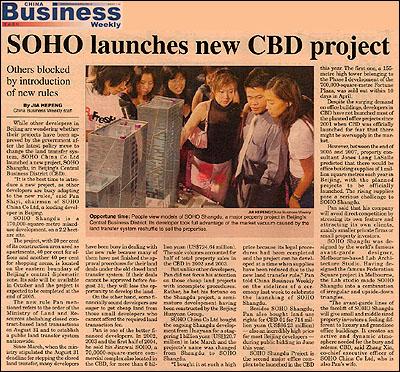
People view models of SOHO Shangdu, a major property project in Beijing's Central Business District. Its developer took full advantage of the market vacuum caused by the land transfer system reshuffle to sell the properties. [China Business Weekly]
While other developers in Beijing are wondering whether their projects have been approved by the government after the latest policy move to change the land transfer system, SOHO China Co Ltd launched a new project, SOHO Shangdu, in Beijing's central business district (CBD).
"It is the best time to introduce a new project, as other developers are busy adapting to the new rules,'' said Pan Shiyi, chairman of SOHO China Co Ltd, a leading developer in Beijing.
SOHO Shangdu is a 170,000-square-metre mixed-use development, on a 2.2 hectare site.
The project, with 20 per cent of its construction area used as apartments, 40 per cent for offices and another 40 per cent for shopping areas, is located on the eastern boundary of Beijing's central diplomatic zone. Its sale will be available in October and the project is expected to be completed at the end of 2005.
The new rule Pan mentioned refers to the order of the Ministry of Land and Resources abolishing closed contract-based land transactions on August 31 and to establish a public land transfer system nationwide.
The new system requires that the use-rights of all land should be transacted through tenders, auctions or public sales held by city or county governments. The money to buy land must be paid off within 60 days of the land deal.
Since March, when the ministry stipulated the August 31 deadline for stopping the closed land transfer, many developers have been busy in dealing with the new rule because many of them have not finished the approval procedures for their land deals under the old closed land transfer system. If their deals cannot be approved before August 31 -- which is very likely because under the old system, some real estate developers with good government links often default on the required land transaction fee -- they will lose the opportunity to develop the land.
On the other hand, some financially sound developers are eager to get cheap land from those small developers who cannot afford the required land transaction fee.
Pan is one of better financed developers. In 2002, 2003 and the first half of 2004, he sold his Jianwai SOHO, a 70,0000-square-metre commercial complex also located in the CBD, for more than 6 billion yuan (US$724.64 million). The sale volumes accounted for half of total property sales in the CBD in 2002 and 2003.
But unlike other developers, Pan did not focus his attention on those cheap land projects with incomplete procedures. Rather, he bet his fortune on the Shangdu project, a semi-mature development having been constructed by the Beijing Huayuan Group.
SOHO China Co Ltd bought the ongoing Shangdu development from Huayuan for a staggering 1 billion yuan (US$120.7 million) in late March and the projects's name was changed from Shangdu to SOHO Shangdu.
"I bought it at such a high price because its legal procedures had been completed," Pan told China Business Weekly on the sideline of a ceremony last week to celebrate the launching of SOHO Shangdu.
Buying and developing the Shangdu project can give the market a product at a time when supplies have been reduced due to the new land transfer rule and people are worrying whether sufficient developments will be available in the near future, Pan said.
Besides SOHO Shangdu, Pan also bought land-use rights for CBD-01 for 714 million yuan (US$86.23 million) -- also an incredibly high price for most Beijing developers -- during public bidding in June this year.
SOHO Shangdu Project is the second major office complex to be launched in the CBD this year. The first one, a 155-metre high tower belonging to the Phase I development of the 700,000-square-metre Fortune Plaza, was sold out within 10 days in April.
The general plan for the CBD -- which was formally launched in 2001 -- calls for 10 million square metres of buildings, including 5 million square metres of new office space, 2.5 million square metres of residential area and 2.5 million square metres of hotels and other recreation facilities.
Major commercial developments in the CBD include the 500,000-square-metre Phase III development of the China International Trade Centre, 1-million-square-metre China Central Place, 300,000-square-metre Yintai Centre and Jianwai SOHO.
Despite the surging demand on office buildings, developers in CBD have not launched most of the planned office projects since 2001 for fear that there might be oversupply in the market.
However, between the end of 2005 and 2007, property consultant Jones Lang LaSalle predicted that there would be office building supplies of 1 million square metres each year in Beijing, with the planned projects to be officially launched. The rising supplies pose a serious challenge to SOHO Shangdu.
Pan said that his company will avoid direct competition by stressing its own feature and attracting its own clients, mainly smaller private firms or small property investors.
SOHO Shangdu was designed by the world's famous avant-garde designer, Melbourne-based Lab Architecture Studio. Having designed the famous Federation Square project in Melbourne, the Lab studio made SOHO Shangdu into a combination of irregular and upside-down triangles.
"The avant-garde lines of the facelift of SOHO Shangdu will give small and middle sized property investors a feeling different to luxury and grandiose office buildings. It creates an active and dynamic atmosphere needed for the busy and solemn CBD, said Zhang Xin, co-chief executive officer of SOHO China Co Ltd, who is also Pan's wife.





